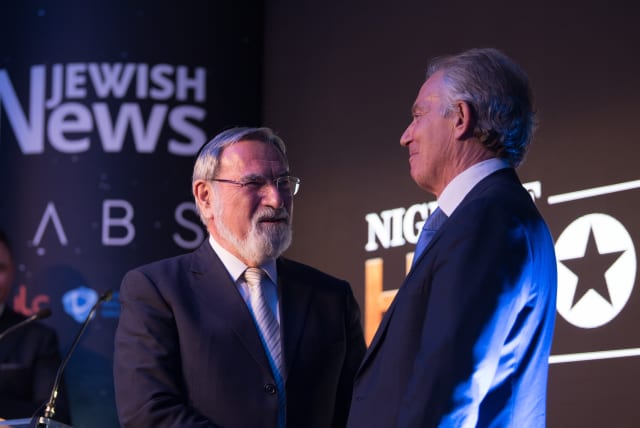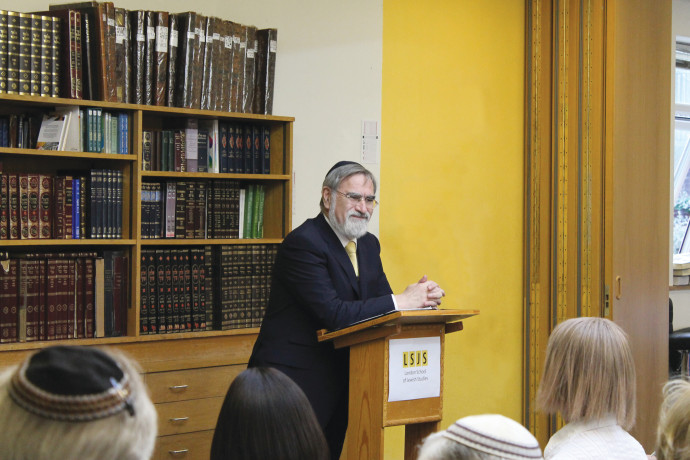Rabbi Lord Jonathan Sacks’s second yahrzeit -opinion

The following is an adaptation of my opening statement at the launch event hosted by President Isaac Herzog, in Jerusalem, the city of hope, perhaps the most meaningful possible venue.
"Leaders see the destination, begin the journey and leave behind them those who will continue it. That is enough to endow a life with immortality.”
Communities worldwide are marking Rabbi Lord Jonathan Sacks’s second yahrzeit as part of the annual “Communities in Conversation.”
The following is an adaptation of my opening statement at the launch event hosted by President Isaac Herzog, in Jerusalem, the city of hope, perhaps the most meaningful possible venue.
Everyone in that room, and so many in Israel and around the world, disciples of the late Rabbi Sacks, are committed to continuing the journey he began.
That is the humbling honor and awesome responsibility that I, alongside other trustees of the Rabbi Sacks Legacy, have committed to undertake, with a growing sense of relevance and urgency.
Rabbi Sacks (zt”l) had a singular, eloquent voice that he used to reach across differences and deliver overarching messages that are sorely needed and missed.
He was a fearless thought leader, prepared to engage in respectful discussion with all, ingeniously binding together people of all backgrounds and faiths – religious and secular, in Israel and around the globe – based on mutual values, identity and faith.
The gaping vacuum that his passing has created presents an unparalleled opportunity and, alongside it, a tremendous obligation. In the face of intersecting global and local challenges, always and at this particular moment in time, for Israel and for Jews around the world; his legacy that bridges divides, harbors the potential of filling the void created by his physical absence with a global message – of hope, comfort and unity, at a time of distrust, distress and instability.
Apart from a deep personal connection, my own decades-long journey of learning from and engaging with the teachings of Rabbi Sacks, began with A Letter in the Scroll, received and read as a school board member, a young parent and a Jewish community leader.
It shaped my pre-existing sense of responsibility with an empowering message of the ability to heal my fractured world, and gather strength to continue from there, in a butterfly effect, to community, country and society.
In its spiral, continued, consistent messaging, Rabbi Sacks’s prolific writing and teaching embody Hillel’s famous aphorism: “If I am not for myself, who will be for me? And if I am only for myself, what am I? And if not now, when?” In any and all of his roles and capacities, it seems that the late Rabbi Sacks breathed life into this saying.
In everything he did, wrote and taught, Rabbi Sacks encapsulated and exemplified its extraordinarily difficult balance, weaving together the link-in-the-chain continuum – between personal and shared responsibility; between universal and particular values; between recognizing the dignity of difference and knowing who we are as individuals and a collective.
Transcending time and space, his uncanny ability to connect past, present and future enables and empowers him to remember the past, in order to implement its lessons in the present, generating hope for the future.
In imparting the gift of his world view on The Dignity of Difference, his unwavering moral clarity and call to responsibility, accountability and action, believing that we separately and together can, indeed must, make a difference, and that knowing our past is the key to shaping our future. His teachings are, in so many senses, the bridges we so need – leading us beyond ourselves and toward one another.
Possibly the most significant and timely bridge that Rabbi Sacks created the infrastructure for, is between global Jewry and our nation-state, Israel. It is the journey across that bridge that brought us back, to Jerusalem, the eternal city of hope. It is this bridge that we must not only be committed to continuing to construct but to make accessible and available to growing numbers in Israel.
The recently launched “Sacks Conversation” and “I Believe” build yet another critical tier in the shared identity of Jews, in Israel and globally, in many ways enabling us to reclaim Zionism as a connector and catalyst, securing our existential engagement and relationship.
Having already translated much of his writing, the continued shared project enables us to build a society in Israel, while benefiting from the aggregated experience and insights of community-building that Rabbi Sacks’s books bring to life in Hebrew.
Critical lessons to implement
As recent events underscore, more than ever these are critical lessons to implement, for each and all to hear and heed the call of leadership; to sound our unique voice in order to realize personal and collective abilities; to recognize the incredible fortune of the miraculous time in which we live; to feel and take responsibility for the continuity of Israel and the Jewish people.
I reflect often on conversations with Rabbi Sacks about his sense of an incomplete journey into Israeli society. More than ever before, I am certain of the crucial need for his voice in the construction of the next 75 years of Israel, a nation-state to which Jews, an indigenous people, returned after millennia of exile and persecution, committed to equality, as clearly stipulated in the Declaration of Independence.
I am certain of the imperative to enlist leading voices, including in the Israeli mainstream, that will continue the journey, equipped with the map of his legacy; in order to fulfill Israel’s vision, mission and values internally, as a nation-state, and as member in the family of nations.
His singular moral clarity underscores that nation-building locally and community-building globally are interwoven, complete one another, and must advance in two-way engagement, on the all-too-narrow bridge, if we are to fulfill the amazing ability and awesome responsibility of our generation.
The historic intersection of national liberation and sovereignty, and international liberty and equality, enables and demands not severing, but deepening of our covenant of destiny, not only our covenant of fate.
Rabbi Sacks observed that “Optimism and hope are not the same. Optimism is the belief that the world is changing for the better; hope is the belief that, together, we can make the world better. Optimism is a passive virtue, hope an active one. It needs no courage to be an optimist, but it takes a great deal of courage to have hope...”
Hatikvah – the hope – is, more than ever, the active courage to – together – continue the journey that this leader of our time began.
The writer is a lawyer, research fellow and policy and strategy adviser on issues of human rights, Israel-Diaspora relations, and the fight against antisemitism. She served as an MK in the 23rd Knesset, co-founding the International Bi-Partisan Task Force to Combat Online Antisemitism and serves as a trustee in The Rabbi Sacks Legacy.
Jerusalem Post Store
`; document.getElementById("linkPremium").innerHTML = cont; var divWithLink = document.getElementById("premium-link"); if (divWithLink !== null && divWithLink !== 'undefined') { divWithLink.style.border = "solid 1px #cb0f3e"; divWithLink.style.textAlign = "center"; divWithLink.style.marginBottom = "15px"; divWithLink.style.marginTop = "15px"; divWithLink.style.width = "100%"; divWithLink.style.backgroundColor = "#122952"; divWithLink.style.color = "#ffffff"; divWithLink.style.lineHeight = "1.5"; } } (function (v, i) { });

